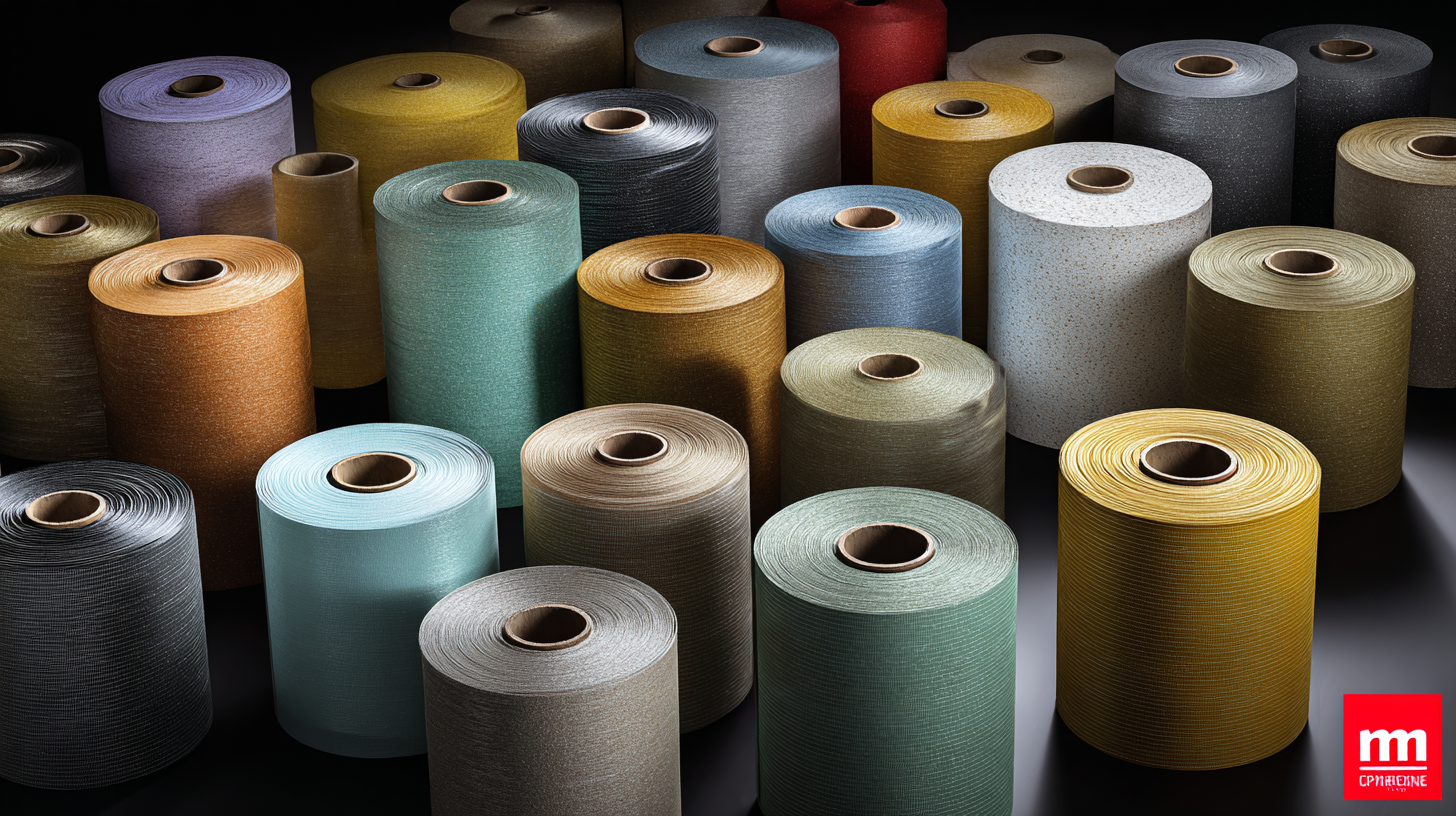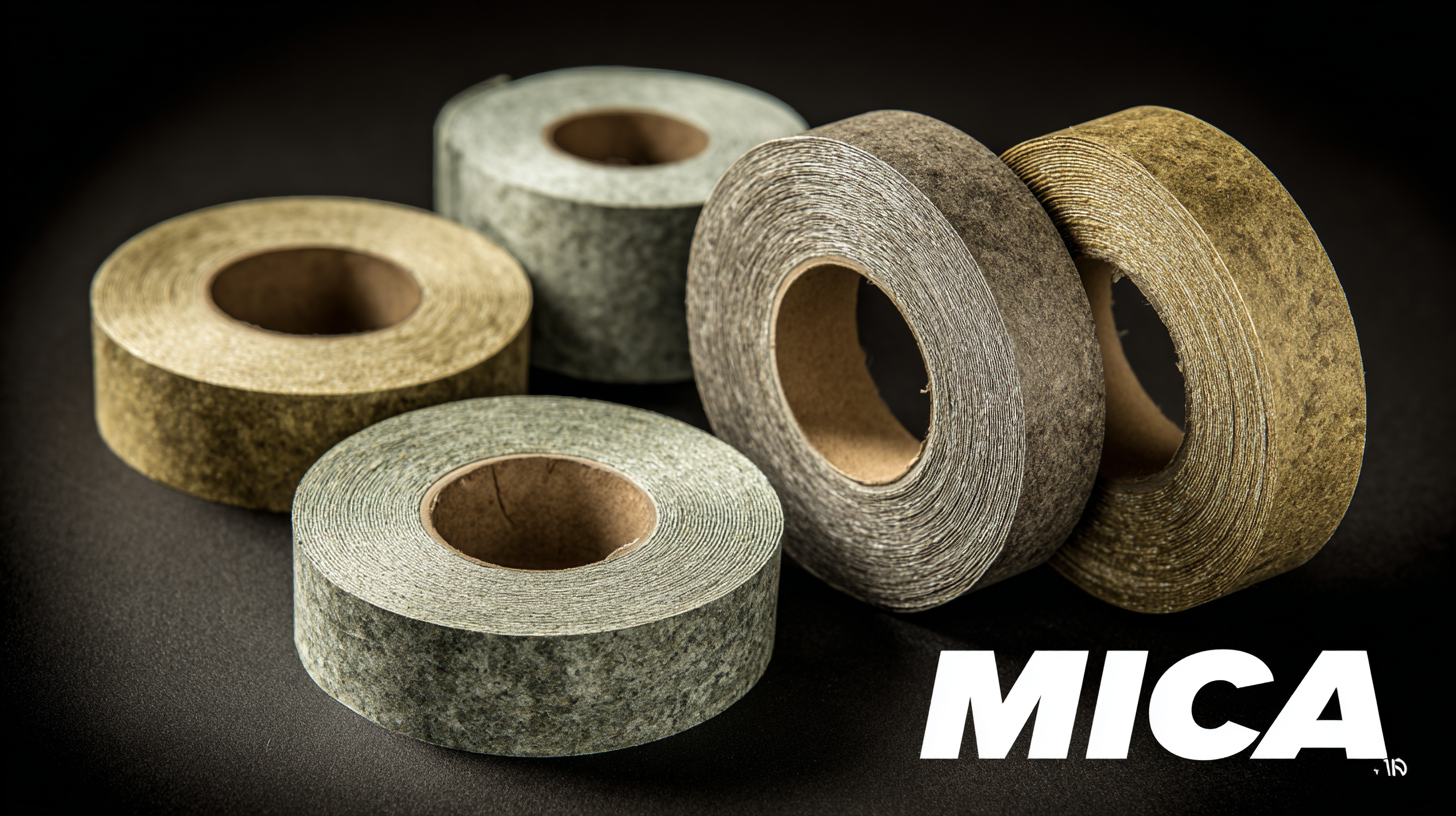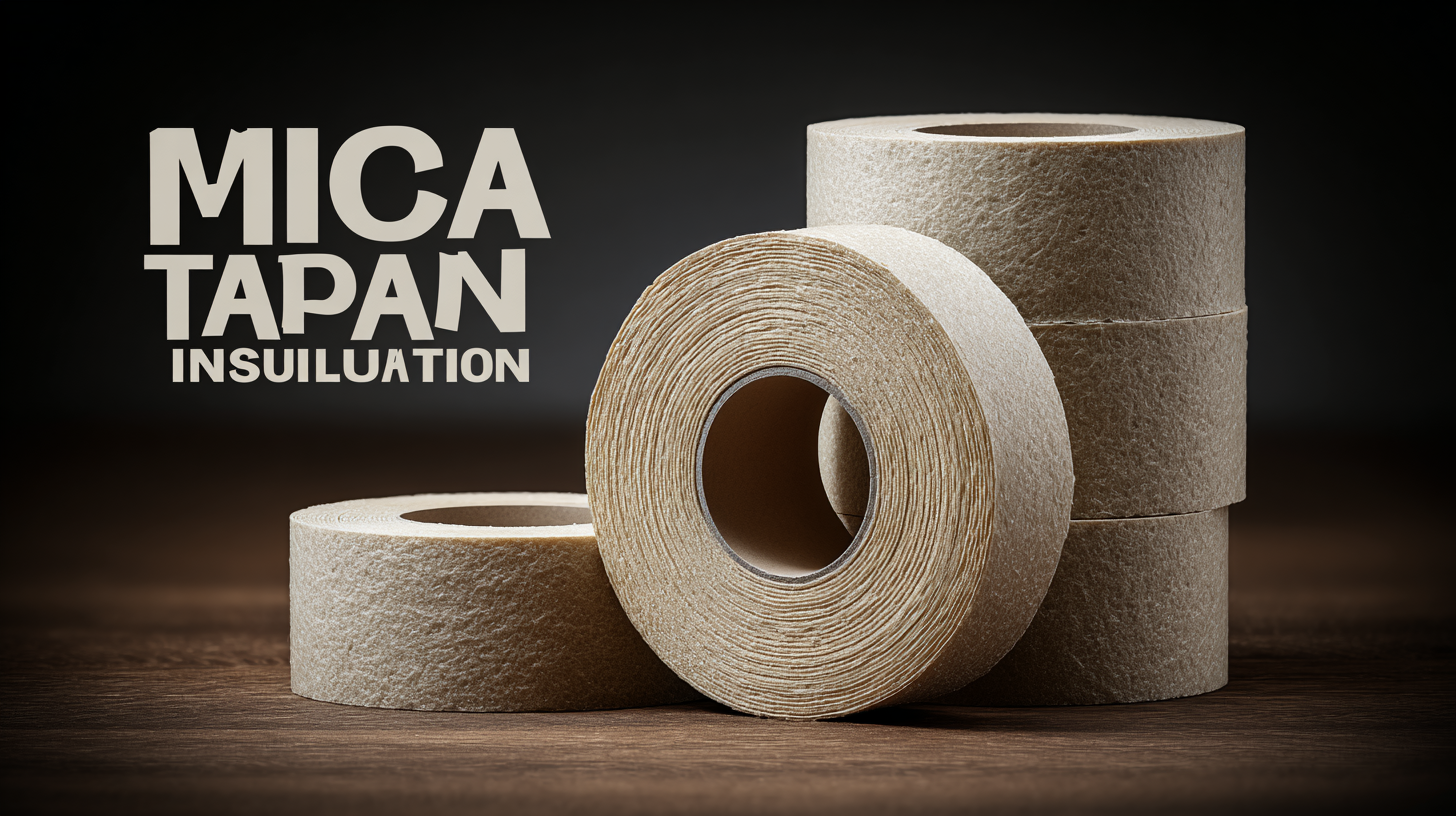QR Code
About Us
Products
Contact Us

Phone

Fax
0086-574-87527773

E-mail

Address
No 432 Zhenhai Middle Road, Luotuo Street, Zhenhai District, Ningbo City, Zhejiang China
In the industrial sector, Mica Tape Insulation is widely recognized for its superior thermal resistance and electrical properties, making it a staple in various high-temperature applications. According to a report by the market research firm Grand View Research, the global market for electrical insulation materials is projected to reach USD 20 billion by 2025, driven by the increasing demand for energy-efficient equipment. However, choosing the best Mica Tape Insulation for specific industrial needs can be challenging, as various factors such as temperature rating, thickness, and adhesive type play crucial roles in performance and durability. As industries continue to evolve, understanding the nuances of Mica Tape Insulation becomes essential to ensure optimal functionality and reliability in demanding environments.

Mica tape is a crucial material used in various industrial applications, known for its excellent thermal and electrical insulation properties. Composed of layers of mica minerals bound together by a high-performance polymer, mica tape offers high dielectric strength, exceptional temperature resistance, and unparalleled mechanical stability. The choice of mica tape depends on specific industrial needs, such as operating temperatures and electrical insulation requirements. Understanding the different types of mica tape, such as muscovite and phlogopite, is essential for selecting the right product for your application.
In addition to temperature and electrical resistance, it's important to consider the thermal conductivity and flexibility of the mica tape. Mica tape with lower thermal conductivity is ideal for high-temperature applications where insulation is critical, while more flexible options may be better suited for winding and wrapping applications in motors or transformers. Furthermore, industrial applications ranging from electronics to power generation benefit from tailored mica tape solutions, providing advantages in both durability and performance. By comprehensively understanding these properties and applications, businesses can make informed choices to meet their unique insulation needs effectively.
| Type of Mica Tape | Properties | Temperature Resistance | Common Applications |
|---|---|---|---|
| Natural Mica Tape | High dielectric strength, flexible, and durable | Up to 1000°C | Electric motors, generators |
| Synthetic Mica Tape | Improved heat conductivity, moisture resistance | Up to 800°C | Transformers, capacitors |
| Mica Glass Tape | Combines the strength of glass fibers with mica | Up to 950°C | High voltage insulation applications |
| Mica Tape with Adhesive | Easy application, additional bonding | Up to 600°C | Cable insulation, heat shields |
| Mica Tape Reinforced with Inorganic Fibers | Enhanced tensile strength, non-flammable | Up to 1100°C | Aerospace, furnace insulation |
When selecting the best mica tape insulation for your industrial needs, several key factors should be prioritized. First and foremost, you need to understand the temperature and environmental conditions in which the insulation will operate. Mica tape is renowned for its excellent thermal properties and ability to withstand high temperatures, making it suitable for applications where heat resistance is critical. Assessing the specific temperature ratings and ensuring they match your operational requirements is essential for optimal performance.

Another crucial aspect to consider is the ease of installation and maintenance. Similar to effective window insulation that provides a barrier to drafts, good mica tape should facilitate straightforward installation without compromising safety or performance. Look for options that offer user-friendly applications, enabling your team to apply the insulation efficiently. Additionally, durability and longevity are vital. High-quality mica tape will not only withstand harsh conditions but also provide added resistance against moisture, chemicals, and mechanical stress, ensuring your industrial setup remains efficient over time. By focusing on these factors, you can make an informed decision that enhances both safety and productivity in your operations.
When it comes to industrial insulation, mica tape stands out due to its exceptional thermal stability and electrical insulating properties. Compared to alternative insulation materials like fiberglass and PVC, mica tape offers superior performance in high-temperature environments. It can withstand temperatures exceeding 1000°C, making it an ideal choice for industries such as aerospace and power generation, where equipment operates under extreme conditions. Unlike fiberglass, which can deteriorate over time and lose its insulating properties, mica tape maintains its effectiveness, providing long-lasting reliability.

Moreover, the flexibility and ease of application of mica tape give it an edge over alternatives. While materials like ceramic insulation can be rigid and difficult to handle, mica tape can conform to various shapes and sizes, ensuring a snug fit on diverse components. This adaptability, combined with its lightweight nature, makes mica tape not only a practical choice but also an economical one, as it reduces installation time and labor costs. When evaluating insulation options, considering the durability and temperature resistance of mica tape compared to other materials is crucial for making an informed decision.
When selecting mica tape insulation for industrial applications, it is crucial to consider industry standards and compliance. Mica tape is often utilized in high-temperature environments due to its excellent thermal properties. Different industries, such as electrical and manufacturing, have specific requirements that dictate the grade of mica tape necessary for optimal performance. Compliance with standards set by organizations like ASTM (American Society for Testing and Materials) or IEC (International Electrotechnical Commission) ensures that the mica tape can withstand the challenges posed by heat, moisture, and electrical insulation.
Furthermore, it's important to review certifications and testing results of mica tape products. Compliance with safety standards not only guarantees the performance of the tape but also minimizes risks associated with electrical failures and fire hazards. Industries should prioritize sourcing mica tape from reputable suppliers who provide documentation of compliance and performance testing. This scrutiny helps ensure that the selected insulation meets the necessary specifications for durability and efficacy, ultimately supporting safe and reliable operations within the industrial environment.
When selecting mica tape insulation for industrial applications, the durability and efficiency of the material are paramount, particularly in high-temperature environments. Mica tapes are inherently resistant to heat, making them ideal for applications ranging from electrical insulation to thermal barriers. Their ability to withstand temperatures exceeding 1000°F ensures that equipment maintains optimal performance without risk of thermal degradation.
When choosing mica tape, consider its thickness and type. Thicker mica tapes provide enhanced insulation and better durability, especially in environments subject to mechanical stress. Additionally, ensure the tape is treated with a high-quality binder that improves thermal stability and resistance to chemical exposure. This gives the tape a longer lifespan and higher efficiency during operations.
**Tips:**
- Always assess the maximum temperature rating of the mica tape to suit the specific environmental conditions of your application.
- Look for mica tapes that come with certifications from recognized standards to ensure reliability and safety.
- Regularly inspect the installed insulation for signs of wear or damage, and replace it promptly to maintain safety and efficiency in your processes.


0086-574-87527773


No 432 Zhenhai Middle Road, Luotuo Street, Zhenhai District, Ningbo City, Zhejiang China
Copyright © 2015-2024 Ningbo Nafty Sealing Materials Co., Ltd. All Rights Reserved.
| | | XML | Privacy Policy |
TradeManager
Skype
VKontakte
